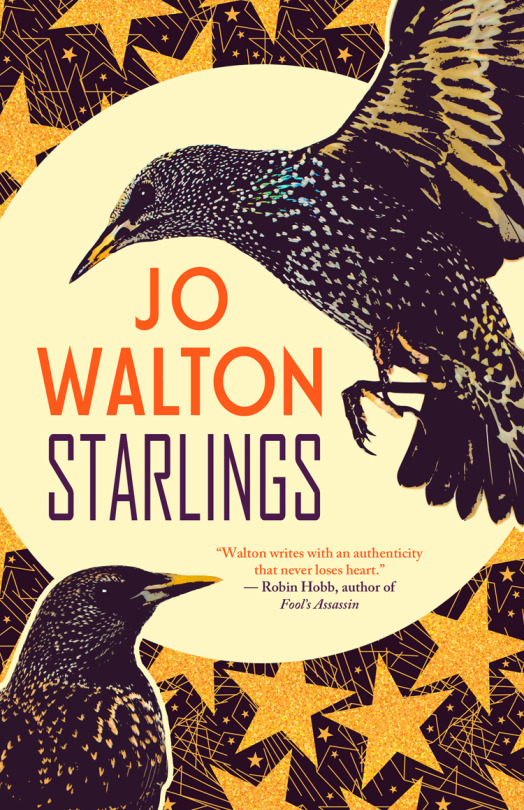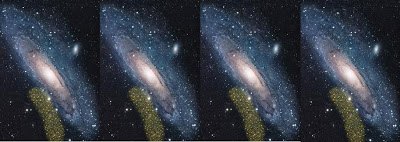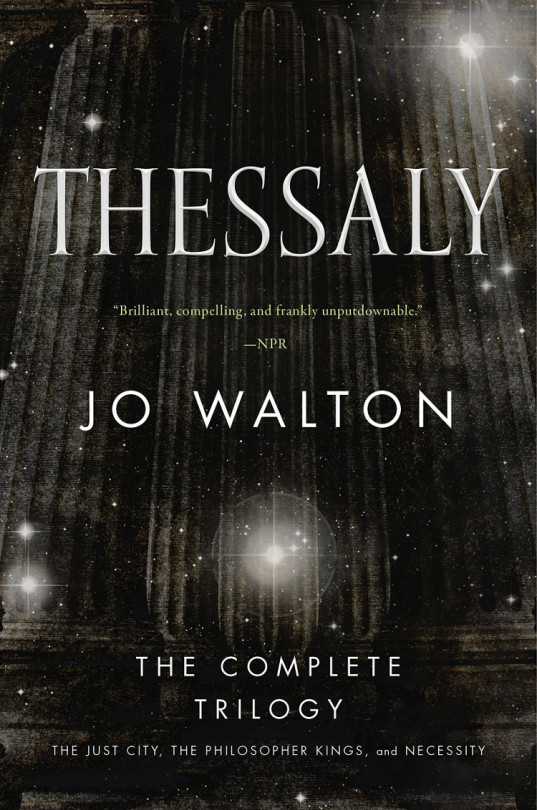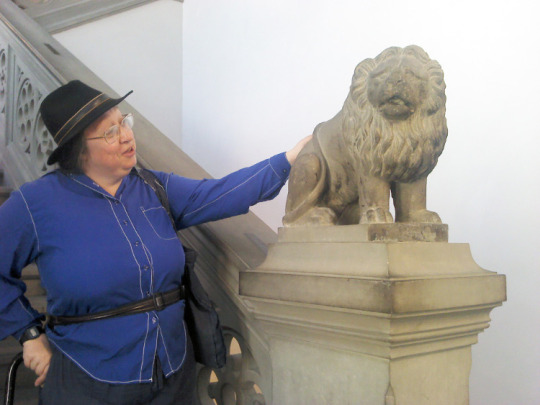STARLINGS delivers an entertaining look into Jo Walton’s imagination
Three fresh reviews of Jo Walton’s interesting STARLINGS plus some other interesting JoWaltonian bits.

For LOCUS, Gary K. Wolfe praises the collection.
All this may suggest that Starlings is something of a farrago, and it is – an entertaining if often uneven look into the mostly lighter side of Walton’s imagination. But STARLINGS also displays Walton’s formidable erudition, and her fascination with the various forms stories can take. When she deals with folkloric or mythical materials, she can evoke the haunting rhythms of the told tale, as in the three elegantly interwoven stories that make up “Three Twilight Tales” – the most structurally complex piece here – or turn the tale of the Bacchae into a small-town drama told in Kiplingesque rhymes. The longest piece in the book, “Three Shouts on a Hill”, is a hilariously manic quest tale in dramatic form, as three hapless sons of an Irish lord try to atone for more-or-less inadvertently murdering the king’s father, an adventure which eventually involves African, Incan, and Japanese gatekeepers, not to mention the King of the Cats, the Pope, and Oliver Cromwell. “Three Bears Norse” retells Goldilocks as a Norse skald might have told it, complete with kemmings and caesuras. As might be evident by now, even though readers might be tempted to skip over them, the poems in this collection are as important to understanding Walton’s approach to story as they were in Jane Yolen’s recent Tachyon collection. The simple fact that one sequence is titled “The Godzilla Sonnets” – which I won’t describe further – should give a good sense of Walton’s wandering, curious, and unique imagination, and STARLINGS as a whole may be the most interesting anatomy of that imagination than we’ve yet seen in one volume.
Juli Witte at UNIVERSE IN WORDS enjoys the book.
It is no secret that I love short stories. They are so hard to write, but are beautiful to read. There is something brilliant about how authors manage to create a whole world, complete characters and stunning story in just a few pages. So when I saw STARLINGS, I wanted to read it straight away. I had heart of Jo Walton before but actually hadn’t read anything by her yet. Knowing she writes Science Fiction and then seeing the mention of legends in the below blurb, I had a feeling that I would love STARLINGS. And guess what, I did!
<snip>
Walton is an award-winning novelist, so she really doesn’t need me commenting on her writing style. But I’m going to anyway. I really enjoyed how surprising each story was. By being open in the introduction about the fact she was experimenting with these stories, I went into STARLINGS not knowing what to expect and being excited about that. Almost every story felt like a thought exercise, especially when you could see Walton had been inspired by something and had decided to take it one step further, to see how far she could push a certain thought or idea. I enjoyed all the different directions that STARLINGS went to, whether it was into space, into the mind of a computer, heaven, or the future. Also, if something perhaps didn’t entirely work, then Jo Walton is the first to admit it and suggest why. For an established author to take risks like these is really interesting and as an aspiring author myself I actually found it really inspiring. I will definitely be rereading STARLINGS in the future, even if only for the sheer fun of some of her stories.
I give this collection…

4 Universes!
I adored STARLINGS and pretty much raced through the different stories! Jo Walton takes risks with her stories and imagery and it really pays off. I loved being surprised by every story, wondering what was going to happen next etc. Whether you’ve already read her novels or are new to Walton like me, definitely check out STARLINGS!
THE IMAGINARIES likes the book.
Having purchased Thessaly: The Complete Trilogy through our local book exchange some time ago and having (typically) not found the bravery to pick it up yet (it’s a massive compendium), I am familiar with the name Jo Walton without having actually read a single work of hers. STARLINGS provides, I think, the perfect entry point into her voice and way of being in the way that all single-author short story collections do. It is not a perfect book in that it suffers from the usual ailments that such collections suffer: namely, unevenness in quality, content, and voice. In her introduction, Walton herself admits that it is something of a grab-bag of odds and ends. (She writes: “So here in one place for your reading convenience are two short stories that I wrote after I knew what I was doing, two I wrote before I knew what I was doing, some exercises, some extended jokes, some first chapters of books I didn’t write, some poems with the line breaks taken out, and some poems with the line breaks left in.”) But that is not to say this is not a worthwhile or enjoyable book; it absolutely is!

I will confess to being moved more easily by Walton’s prose than her poetry (or her play, alas) but I emerge from this collection encouraged, and affirmed in my decision to purchase Thessaly: The Complete Trilogy without knowing the first thing about it. Walton is an author with range, and talent. I will be reversing time and reading her past works in the future with pleasure.

At TOR.COM in celebration of National Poetry Month, Stubby the Rocket shares the first part of Walton’s THE GODZILLA SONNETS.
The first sonnet clearly inspired Walton to insert Godzilla into a number of tales, Shakespearean and otherwise. Subsequent sonnets show us Verona fallen to those massive feet (the Montague/Capulet feud stood no chance), and the kaiju even weeping for Baldur…
Here’s the poem that started everything:
i) Godzilla Vs Shakespeare
Up on the ramparts all await their time
Each heroine, the fools and knaves, each king,
Ready to catch our hearts, the play’s the thing
A cockpit where they arm themselves with rhyme.The monster tries to hide, but shows through plain,
Behind a frond ripped up with giant claws
We see his scaly hide and gaping jaws
As Birnam tropics come to Dunsinane.All rally to defend now, each with each,
Juliet with dagger, Richard on a horse,
Dear Hamlet with his poisoned foil of course,
Harry with swords and longbows, at the breach.Godzilla, shuffling closer, knows what’s what.
Size matters. But then so do prose and plot.
Chris Urie at CLARKESWORLD interviews Walton.
In your introduction for STARLINGS, you talk about not so much being a short story writer, but more of a poet. Can you elaborate on this?
Poetry is often my natural response to things. And it feels odd and uncomfortable to say that, it feels pretentious and fake, because culturally we often class poetry as “high culture” in a way that makes saying that feel like making a claim about all kinds of things that have nothing to do with actual poetry. I have always written poetry, I’ve always read poetry. Sometimes poetry is easier for me than actually talking. When John M. Ford died—he was a friend, and he was a writer I admired, and his death was very sudden and shocking—I wrote a sestina in which the end words were the last words of titles of his books. And that sounds like a very abstract distanced thing, but I did it in the early hours of the morning with tears running down my face and that was my grief response, my raw response. (It’s in my NESFA collection Sibyls and Spaceships and it’s on my website if you want to read it.) I have a poem bio in the Starlings collection that says a poem is much easier than writing a short bio listing your accomplishments, and for me that’s true.
Whereas short fiction, though I read it, has never come naturally. I almost never have an idea and think it’s a short story idea. I’ll have an idea and think it’s a novel idea. I’ll want to say something and it’ll come out as poetry. But short stories are almost always a deliberate effort, an exercise in form. So, this collection collects all the short things I’ve written over almost twenty years, and it’s barely enough for a book, we had to put a play and some poetry in too.
And on the topic of poetry, who would be one poet you feel influenced you most throughout your short fiction?
I can’t answer that with one. I think the answer is T. S. Eliot, and Tolkien, and Auden, and the Romantics especially Keats. T. S. Eliot and Tolkien were contemporaries, though we don’t think of them that way.
Voice and tone play an important role in this collection. What comes first when writing, the voice or the plot?
Voice every time. Voice—or what I call “mode,” which is voice plus a bunch of related things, is what I need before I can write anything. I can have all the plot in the world and without the right voice it’s just a handful of vacuum.
For more info on STARLINGS, visit the Tachyon page.
Cover design by Elizabeth Story
